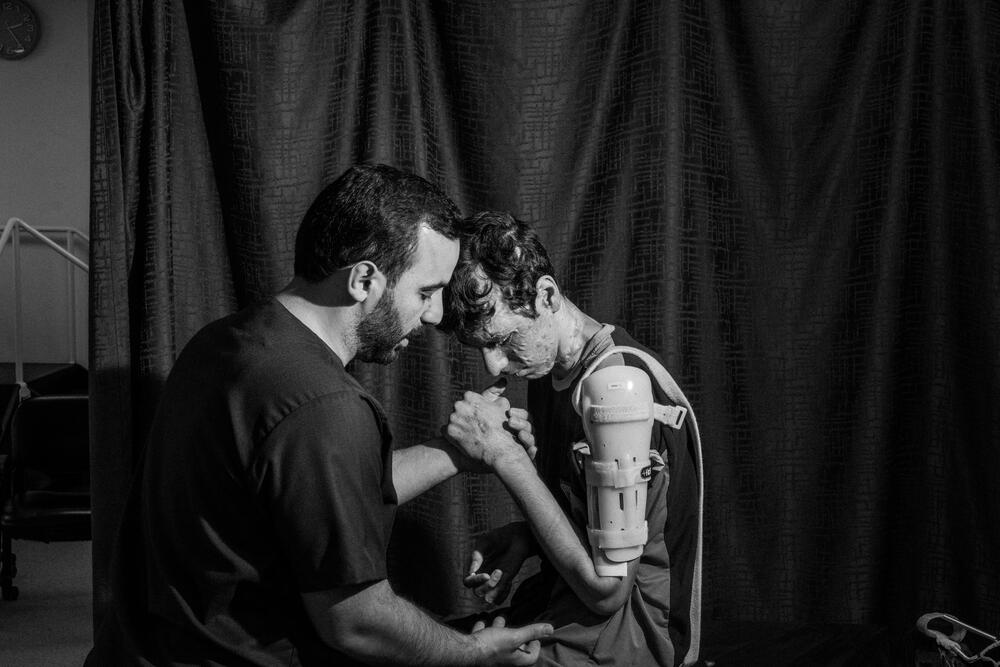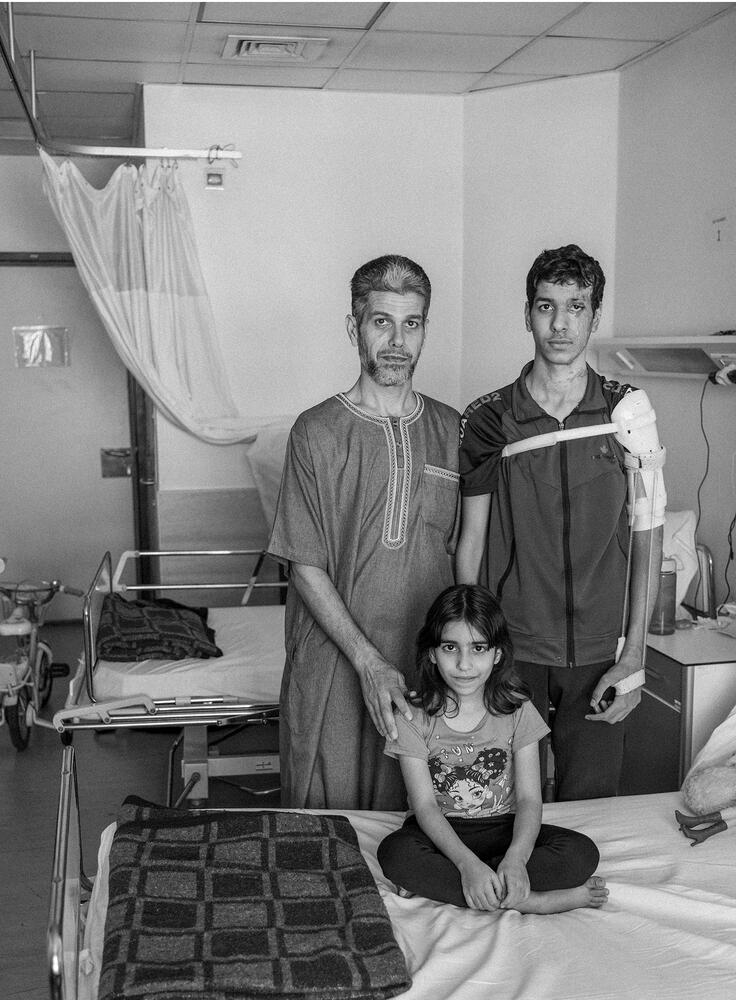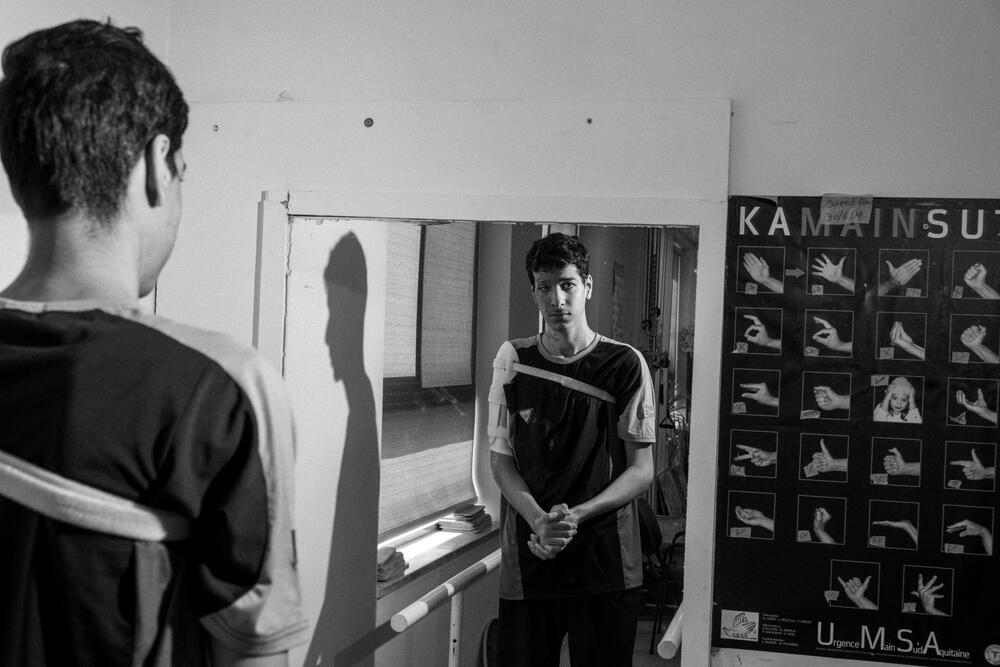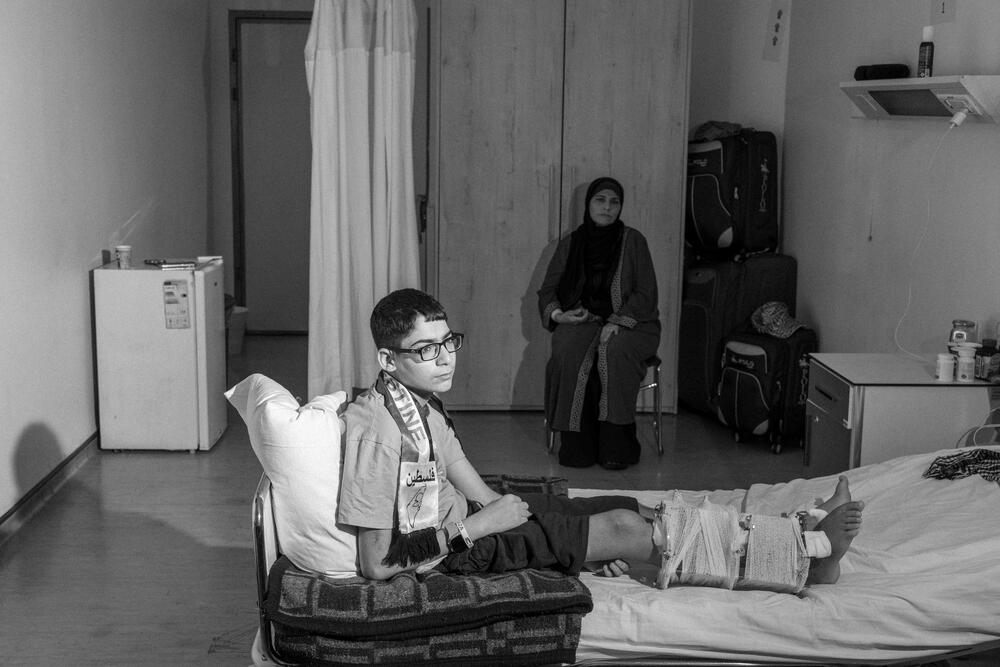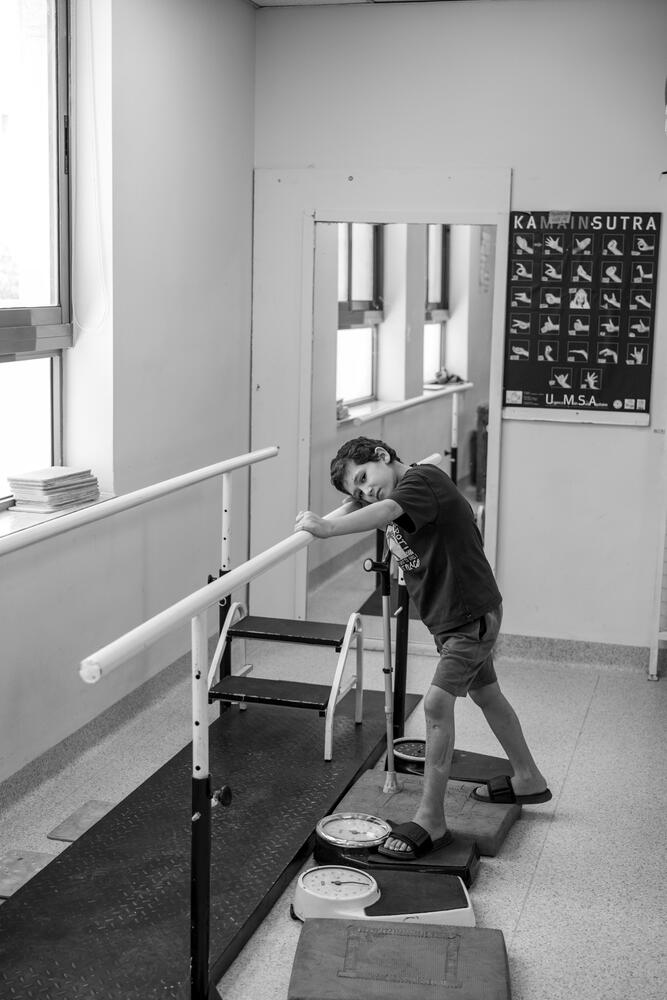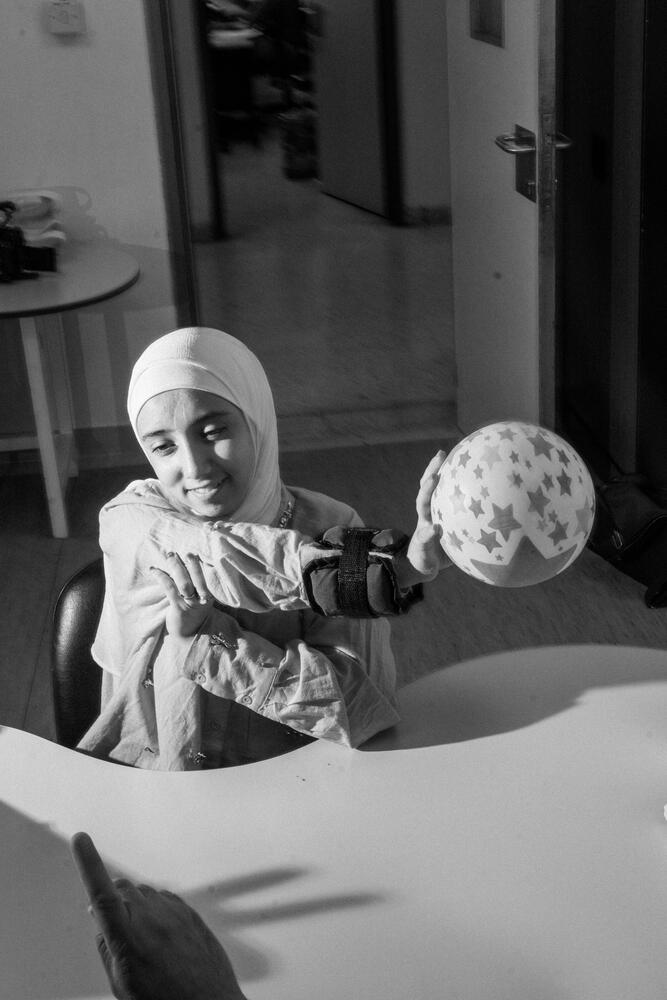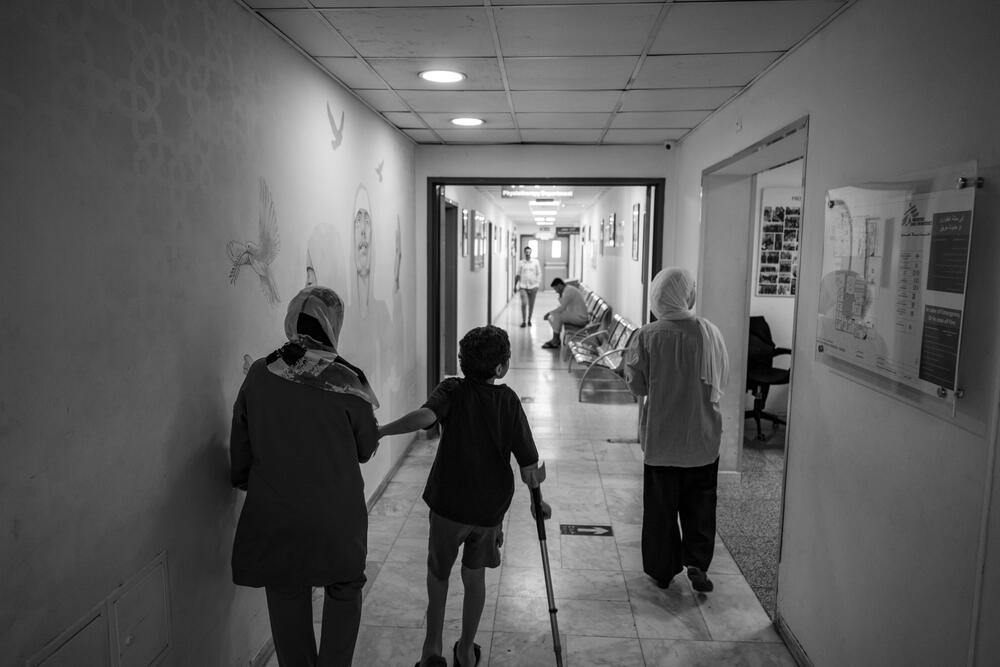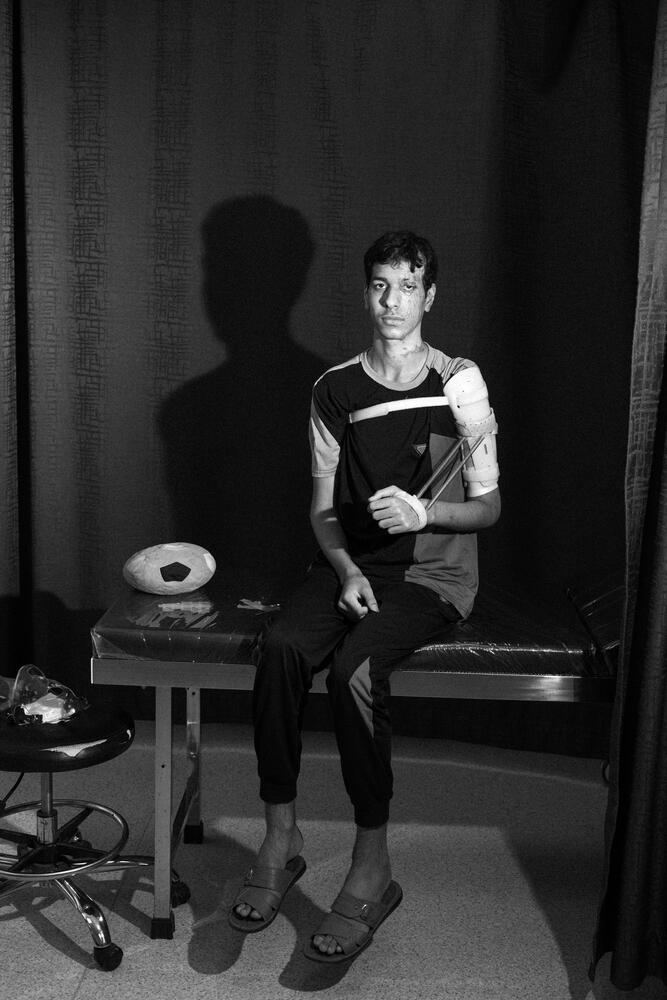Rehabilitating Gaza's wounded children: Inside MSF's specialist hospital
After nearly a year of relentless Israeli attacks on Gaza, a staggering 41,000 people have been killed and 95,000 injured. According to the World Health Organization, at least 12,000 war-wounded people are now in need of medical evacuation.
At the Médecins Sans Frontières / Doctors Without Borders (MSF) specialist reconstructive surgery hospital in Amman, Jordan, our teams are treating the few Gazan children we have managed to transfer for rehabilitation after they were medically evacuated – a tiny proportion of the thousands of people in need of specialised medical care across the Gaza Strip.
As the sun streaks through the small window of the sterile hospital room, warm orange lines fall on to the side of 17-year-old Karam’s face, highlighting ridges of white scars across his left cheek. As he gets up slowly into a sitting position he uses his right hand to strap a long piece of skin-coloured plastic onto his upper left arm.
“I had heard that, when you die, you can still hear people’s voices as they bury you, that you can hear their prayers and their footsteps as they walk away from your final resting place,” says Karam.
“In the ambulance, I could feel the speed bumps but I couldn’t open my eyes. I could still hear voices, so I was afraid, afraid that maybe I was already dead.”
On 14 February 2024, an Israeli airstrike obliterated Karam’s home in Gaza, killing everyone in his family except for his seven-year-old sister, Ghina, and his father, Ziad. Karam was badly injured, with burns across his whole face and body.
That day, Al-Aqsa Hospital was overwhelmed with casualties after the bombing of Nuseirat camp in central Gaza by Israeli forces.
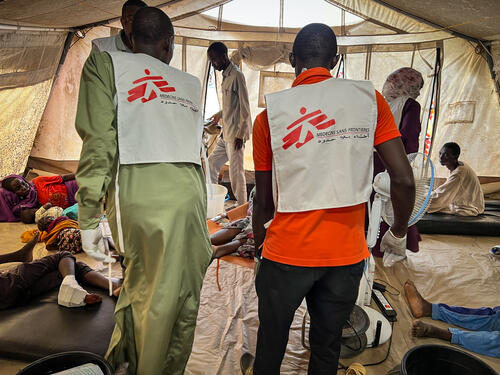
Our work saves lives
When Karam arrived at the hospital, the emergency room team tried to resuscitate him, but without success.
One hour later, Karam’s uncle, who worked as a nurse at Al-Aqsa Hospital, entered the emergency room and realised that his nephew was still breathing. He rushed Karam to the operating theatre, where MSF staff performed CPR and emergency surgery, saving his life.
His father, Ziad, a psychologist for UNRWA (the UN agency for displaced Palestinians), was working at a refugee centre when his family home in Nuseirat was hit.
“When I found out about the strike, I rushed to Al-Aqsa, as my neighbour told me that Ghina and Karam had been taken there,” says Ziad. “I got to the emergency room and there were bodies everywhere, all over the floor. I found my daughter, Ghina; she had first-degree burns on her face, shoulders and back.”
Karam's journey
The impact of the bomb dropped on Ziad’s home was so profound that the remnants of the house were suctioned into the ground. The bomb killed 13 members of Ziad’s family, including his wife, his youngest son Mohammed and his eldest son Tareq. Tareq had become stuck in Gaza due to the war while visiting from Russia, where he was studying dentistry.
“When Karam was brought into the emergency room, I didn’t notice it was my son,” says Ziad. “He had no human features on him. There were no clothes left on him. His body was completely black. His eyes were closed.”
After stabilising Karam, MSF and Ministry of Health staff at Al-Aqsa Hospital performed six rounds of plastic surgery on Karam’s severely burned body. For seven days he was in a coma.
Karam was later evacuated to the UAE's 'floating hospital' on board a boat docked at Al-Arish in Egypt. He was then flown to MSF's reconstructive surgery hospital in Amman, where he is currently receiving comprehensive rehabilitation, along with his sister and other patients who have been medically evacuated from Gaza.
Trapped in Gaza
The small number of patients from Gaza receiving vital rehabilitation at MSF’s hospital in Amman are barely a ripple on the surface of the deep ocean of needs across the Gaza Strip.
“We know from our experience at the reconstructive surgery hospital in Amman, where we have treated people with war wounds from the region for nearly 20 years, that typically up to four percent of people who suffer war injuries will need reconstructive surgery,” says Moeen Mahmood Shaief, Head of MSF in Jordan.
“In the case of Gaza, we are talking about nearly 100,000 people who have been injured since 7 October, therefore we are looking at up to 4,000 people in Gaza who need reconstructive surgery and comprehensive rehabilitation,” he says.
Medical evacuation refused
The process that allows a wounded patient to be referred abroad for care is long and complicated. The Israeli authorities’ criteria for approving requests are unclear and patients often have to wait months for a response.
Almost 60 percent of requests for medical evacuations from Gaza are turned down, according to the World Health Organization. This includes requests to evacuate wounded children and their relatives, according to MSF.
“Of the eight cases for which we applied for medical evacuation in August, only three were approved with their caretakers by the Israeli authorities,” says Dr Hani Isleem, MSF project coordinator for Gaza medical evacuations.
“We will apply again for the next batch, but it is 100 percent clear that they will not approve all the patients. Perhaps they are suspicious of allowing adults to leave the Gaza Strip, but even that suspicion cannot explain the refusal to evacuate children.”
The mental health impact for Gaza’s war-wounded
MSF mental health teams treating patients at the Amman hospital have noted that, before the start of the war, Palestinians from Gaza already suffered from depression and frustration, often related to unemployment, poverty and high addiction rates, as well as to disabilities and amputations caused by previous wars. However, since 7 October the mental health of Gazans has deteriorated dramatically.
“A lot of patients coming from Gaza to the Amman hospital are experiencing not only post-traumatic stress disorder, but even acute-stress syndrome,” says Dr Ahmad Mahmoud Al Salem, an MSF psychiatrist.
“This means that the patients usually have a lot of nightmares and a lot of flashbacks, as well as low mood, insomnia and avoidance of the whole memory.”
“This is not a normal trauma. This is a huge, tormenting catastrophe.”
Many Palestinians in Gaza have witnessed the destruction of their homes and the killing of their families, and many have suffered life-changing injuries. On top of that, they are constantly learning of the loss of more family members and friends.
“This is not a normal trauma,” says Dr Al Salem. “This is a huge, tormenting catastrophe, and psychologically their minds are unable to bear all of this stress.”
The mental health team at MSF’s hospital in Amman offer children one-to-one psychological support, as well as educational activities and occupational therapy, to help them feel more empowered. The more severe cases are referred to Dr Al Salem for psychiatric support and medication.
Adolescents are particularly vulnerable to the acute stress and life-changing injuries they have suffered, says Dr Al Salem.
“Adolescents can suffer real misery, as they are just starting to form their personality and their identity,” he says. “They are beginning to understand their place in the world and they are asking themselves: ‘Will I be productive one day, will I be attractive, will I be able to earn money?’”
“These kids need support to rebuild their self-worth and self-esteem,” says Dr Al Salem. “We try to work with them to empower them through occupational therapy and by showing them that they can grow and recover. But it takes time.”
One second at a time
For young Palestinian patients in MSF’s Amman hospital, the future remains dark and unclear. There is still no safe place in Gaza, and while they may be able to return to Gaza physically at some point, the prospects are bleak. All have lost family members, as well as their homes and their schools.
Five months after the catastrophic attack on his home, Karam is walking again, he is able to move his left arm and his left eye is slowly reopening – a near-miraculous recovery considering he was originally thought dead by medical staff at Al-Aqsa Hospital.
Today, Karam is smiling as he lets go of his crutches in the physiotherapy department and grabs hold of the parallel stabilising bars to take a few steps forward.
Before the war he had wanted to become a dentist, like his elder brother Tareq, but since being injured, he is not sure if this will be possible.
“I’m taking it one step at a time,” says Karam. “If the war ends, God willing, we will head back to Gaza. It’s my country, it’s where I spent my whole life. My friends are there. But for now, I’m here and I want to get better, one second at a time.”
MSF and the Israel – Gaza war
An unprecedented humanitarian crisis is unfolding in Gaza. MSF teams have worked to treat the wounded and supply overwhelmed hospitals as indiscriminate airstrikes and a state of siege threaten millions of men, women and children.
Médecins Sans Frontières / Doctors Without Borders (MSF) is horrified by the events that began on Saturday 7 October – both the brutal mass killing of civilians perpetrated by Hamas in Israel, and by the massive attacks on Gaza now being pursued by the Israeli military.
